Texas Tech University Archives
Distinguished Black Red Raiders
In honor of the university's charter centennial, the Texas Tech University Archives curated a large exhibit titled "Education Has No Color: Celebrating Black History at Texas Tech" that was on display in the Library's Croslin Room from January 17-March 16, 2023.
The “TTU Black History Timeline” webpage highlights some of the important milestones and achievements of Black Red Raiders. This page, the “Distinguished Black Red Raiders,” contains the longer version of the biographies featured in the exhibit accompanied by citations and lists of related archival resources found in the University Archives. A special note of thanks to Dr. Matthew J. Johnson and his history students – Erica Calhoun, Hillary Cruz, Michael Hecht, Chase Kirby, Emma Mankowski, and Hudson Sechler – for contributing research and writing for some of the biographies featured in this exhibit.
 Charles Quinton “CQ” Brown Jr. was born in San Antonio, Texas in 1962. His father served in the U.S. Army for 30 years, eventually rising to the rank of colonel, and his paternal grandfather served in the Pacific Theater in Hawaii and Saipan during World War II. Brown received his Bachelor of Science in Civil Engineering from Texas Tech University in 1984, and was commissioned as a distinguished graduate of Tech’s Air Force ROTC program. He was a member of the Eta Upsilon chapter of the Alpha Phi Alpha fraternity during his time at Tech.
Charles Quinton “CQ” Brown Jr. was born in San Antonio, Texas in 1962. His father served in the U.S. Army for 30 years, eventually rising to the rank of colonel, and his paternal grandfather served in the Pacific Theater in Hawaii and Saipan during World War II. Brown received his Bachelor of Science in Civil Engineering from Texas Tech University in 1984, and was commissioned as a distinguished graduate of Tech’s Air Force ROTC program. He was a member of the Eta Upsilon chapter of the Alpha Phi Alpha fraternity during his time at Tech.
Brown has served in a number of roles during his military career. His positions included an F-16 instructor for the United States Air Force Weapons School, aid-de-camp to the Chief of Staff of the Air Force, director for the Secretary of the Air Force and Chief of Staff Executive Action Group, and deputy director for the operations division of the U.S. Central Command. He also served as a national defense fellow at the Institute for Defense Analysis in Alexandria, Virginia. His career as a general officer began when he was appointed as commander of the 31st Fighter wing in Aviano Air Force Base in Italy, and he was promoted to the rank of brigadier general in June 2009. By May of 2013, Brown was promoted to the rank of major general with his appointment as deputy commander for the U.S. Air Forces Central Command. In March 2014 he was appointed as director of operations, strategic deterrence, and nuclear integration of U.S. Air Forces in Europe – Air Forces Africa at Ramstein Air Force Base, Germany. In June of 2015, Brown received his third star when he was appointed as United States Air Forces Central Command. He was appointed as deputy commander of U.S. Central Command in July of 2016. Brown was nominated to succeed General Terrence J. O’Shaughnessy as commander of the Pacific Air Forces in July 2018, a position that promoted him to four-star general.
On March 2, 2020, President Trump nominated Brown to become the next Chief of Staff of the United States Air Force. The United States Senate unanimously confirmed his appointment on June 9, 2020, making Brown the first African American to lead a branch of the United States Armed Forces. Brown is also the first black officer to sit on the Joint Chiefs of Staff since Army General Colin Powell served as chairman from 1989 to 1993. In 2020, Brown was named among Time magazine’s 100 Most Influential People.
See also:
Paul Tubbs, U.S. Air Force Chief of Staff General CQ Brown, Jr. to Speak at Rawls Diversity Symposium, Texas Tech Today, November 7, 2022
Daniel Friend, U.S. Senate Unanimously Confirms Texas Tech Alumnus as Chief of U.S. Air Force, The Texan, June 9, 2022
Glenys Young, Texas Tech Alumnus Chosen to Head U.S. Air Force, Texas Tech Today, June 9, 2022
 Born in Pampa, Texas, on January 28, 1960, Sharon Moultrie Bruner was a competitive track and field athlete
in high school. During her first year at Texas Tech in 1979, she earned a full athletic scholarship after competing
on the women’s track team as a walk-on and, over the course of the next three years, distinguished herself as a
standout student and athlete. In 1981, Moultrie became the first African American as well as the first female athlete to
be elected Homecoming Queen. She was also the first Texas Tech female athlete to earn All-American honors,
for long jump in 1981 and 1982, and was a seven-time NCAA qualifier in sprint and jumping events. In April of 1982,
she won the Outstanding Senior Athlete Award, one of the university’s top women’s athletic prizes.
Born in Pampa, Texas, on January 28, 1960, Sharon Moultrie Bruner was a competitive track and field athlete
in high school. During her first year at Texas Tech in 1979, she earned a full athletic scholarship after competing
on the women’s track team as a walk-on and, over the course of the next three years, distinguished herself as a
standout student and athlete. In 1981, Moultrie became the first African American as well as the first female athlete to
be elected Homecoming Queen. She was also the first Texas Tech female athlete to earn All-American honors,
for long jump in 1981 and 1982, and was a seven-time NCAA qualifier in sprint and jumping events. In April of 1982,
she won the Outstanding Senior Athlete Award, one of the university’s top women’s athletic prizes.
After graduating in the spring of 1983 with a B.S. degree in physical education, Bruner taught and coached boys and girls' cross-country and girls’ track at South Grand Prairie High School, where she was named Coach of the Year and Teacher of the Year. In 1998, she was inducted into Texas Tech’s Athletic Hall of Honor. In 2001, she was admitted into the Texas Black Sports Hall of Fame.
Related collections within the University Archives and the Southwest Collection holdings:
Athletic Media Relations Records, 1928-2012 – player file for Sharon Moultrie (Track), 1979-1998
Margaret E. Wilson Papers, 1935-2007 - file on Sharon Ann Moultrie, 1978-2000)
See also:
Amanda Castro-Crist,
Texas Tech African-American History: Sharon Moultrie Bruner, Texas Tech Today, February 26, 2019
Terry Greenberg,
Corky Classic Kicks Off Indoor Season, Celebrates Life of Texas Tech Athletics’ Oglesby, Texas Tech University System Institutional Advancement website, January 16, 2018
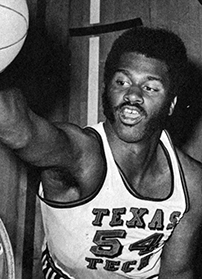 Rick Bullock, born and raised in San Antonio, was one of the greatest Texas Tech basketball players in program history. While attending Jefferson High School, Bullock became a standout on the court. In three years, he scored over 1,900 career points, delivered a UIL 5A Championship game record of 44 points, which still stands today, and held the record for career points in city history until 1997.
Rick Bullock, born and raised in San Antonio, was one of the greatest Texas Tech basketball players in program history. While attending Jefferson High School, Bullock became a standout on the court. In three years, he scored over 1,900 career points, delivered a UIL 5A Championship game record of 44 points, which still stands today, and held the record for career points in city history until 1997.
At Texas Tech, he broke more records and won numerous honors. Bullock was named Southwestern Conference Newcomer of the Year in 1973, SWC Player of the Year in 1975 and 1976, SWC Tournament MVP in 1976, and All-SWC every year he played. By the end of his career, he became the program’s all-time leading scorer with 2,118 points and 1,057 rebounds. He is still the only player with over 2,000 points and 1,000 rebounds. His outstanding athleticism led Tech to become a conference and national powerhouse. Tech won Southwest Conference Championships in 1973 and 1976, appeared in the NCAA Men’s Basketball Tournament in 1973, and made it to the Sweet 16 in 1975.
In the 1976 NBA Draft, Rick Bullock was selected by the New York Knicks in the fifth round and enjoyed a 7-year professional career. He was inducted into the Southwest Conference Hall of Fame in 2013, and Texas Tech Ring of Honor in 2019.
See also:
Rick Bullock Elected to SWC Hall of Fame, Texas Tech Athletics, August 23, 2013
 Timothy Brian Cole was born in Brenham, Texas, on July 1, 1960. He attended Texas Tech University for two years before enlisting and serving in the U.S. Army. After his service, Cole returned to Tech to finish his degree in political science. At the age of 26 in 1985, Cole was wrongfully accused of raping a female sophomore Texas Tech student. On September 17, 1986, he was convicted of aggravated sexual assault and was sentenced to 25 years in prison.
Timothy Brian Cole was born in Brenham, Texas, on July 1, 1960. He attended Texas Tech University for two years before enlisting and serving in the U.S. Army. After his service, Cole returned to Tech to finish his degree in political science. At the age of 26 in 1985, Cole was wrongfully accused of raping a female sophomore Texas Tech student. On September 17, 1986, he was convicted of aggravated sexual assault and was sentenced to 25 years in prison.
In 1995, after the statute of limitations on the 1985 assault had expired, another Texas inmate confessed to the crime for which Cole had been convicted. The confession letters written to judges, the trial prosecutor in Lubbock County, and Cole’s defense lawyer were never acknowledged. Due to complications from asthma leading to a heart attack, a still imprisoned Cole died on December 2, 1999 at the age of 39. The Texas inmate once again wrote a confession letter to a supervising judge, which eventually reached both the Innocence Project of Texas and Cole’s family in 2007. These letters would lead to posthumous DNA testing that excluded Cole as the perpetrator. In a 2009 hearing, the Texas inmate confessed to the assault before a judge, Cole’s family, and the victim. Cole was officially exonerated in a ruling issued on April 7, 2009, and Governor Rick Perry pardoned him on March 1, 2010. Timothy was the first Texan in state history to receive a posthumous pardon.
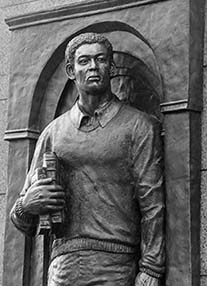 The Timothy Cole Act was passed after Cole’s exoneration. The Act increased the compensation paid to exonerees to $80,000 per year served, expanded services offered to the exonerated after their release, and added compensation for the family of an exoneree if cleared after death. The state also created the Timothy Cole Advisory Panel on Wrongful Convictions in 2009 to study the prevention of wrongful convictions across the state.
The Timothy Cole Act was passed after Cole’s exoneration. The Act increased the compensation paid to exonerees to $80,000 per year served, expanded services offered to the exonerated after their release, and added compensation for the family of an exoneree if cleared after death. The state also created the Timothy Cole Advisory Panel on Wrongful Convictions in 2009 to study the prevention of wrongful convictions across the state.
On February 6, 2012, his family and others gathered near Tim’s grave at Mount Olivet Cemetery in Fort Worth to unveil the first Texas historical marker dedicated to an innocent man who died in prison. The family continued to petition the City of Lubbock and Texas Tech to recognize the injustice done to Timothy and to support a memorial in his name. "Tim may be remembered for things that happened after his life," Cory Sessions, Cole’s brother, told the Lubbock Avalanche-Journal in 2012, "but we remember him for what happened during his life."
In 2014, a 13-foot bronze statue of Cole by noted local Black sculptor Eddie Dixon, with the word “And Justice For All”, was installed on the southeast corner of 19th Street and University Avenue. The $25,000 larger than life statue depicting a Cole holding a book and looking towards Texas Tech university was commissioned by the local law firm Glasheen, Valles and Inderman, who had represented Cole’s family among others in wrongfully conviction cases. The Texas Tech University System regents voted in March of 2015 to posthumously award Timothy Cole an honorary degree in law and social justice. The university held a ceremony honoring Cole on May 15th with speakers President Duane Nellis, Chancellor Robert Duncan and Jeff Blackburn of the Innocence Project of Texas addressing the crowd.
See also:
Timothy Cole, Innocence Project of Texas
Doug Hensley,
Honorary Degree Presented to Timothy Cole Family, Texas Tech University, May 18, 2015
Hilary Hylton,
Texas: The Kinder, Gentler Hang 'Em High State, Time, September 19, 2009
Heidi Toth,
Board of Regents Grants Honorary Degree to Timothy Cole, Texas Tech Today, March 9, 2015
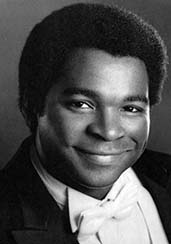 Terry Cook was born in 1956 and raised in Plainview, Texas. After the 1969 tornado, Cook's brother received opera recordings from the town's demolished local school. The music inspired in him a love for opera, and young Cook began participating in school choirs. He also sang in his local Church of Christ and became a song leader when he was just 13 years old. Cook enrolled in Texas Tech University as an engineering major, then switched over to vocal performance. He studied under John and Mary Gillas, award-winning voice professors at Texas Tech with global experience in opera. Both professors taught opera stars David Gaschen and Susan Graham and helped Terry Cook cultivate his distinctive bass voice. During his time at Texas Tech, Terry Cook was a member of the Tech Choir and Phi Mu Alpha, the music honorary society. He sang with the Lubbock Symphony Orchestra and gained an apprenticeship with the Santa Fe Opera while still an undergraduate student.
Terry Cook was born in 1956 and raised in Plainview, Texas. After the 1969 tornado, Cook's brother received opera recordings from the town's demolished local school. The music inspired in him a love for opera, and young Cook began participating in school choirs. He also sang in his local Church of Christ and became a song leader when he was just 13 years old. Cook enrolled in Texas Tech University as an engineering major, then switched over to vocal performance. He studied under John and Mary Gillas, award-winning voice professors at Texas Tech with global experience in opera. Both professors taught opera stars David Gaschen and Susan Graham and helped Terry Cook cultivate his distinctive bass voice. During his time at Texas Tech, Terry Cook was a member of the Tech Choir and Phi Mu Alpha, the music honorary society. He sang with the Lubbock Symphony Orchestra and gained an apprenticeship with the Santa Fe Opera while still an undergraduate student.
When he was just 21 years old, Terry Cook became the youngest person to date to become a semi-finalist in the Metropolitan Opera Southwest Regional Auditions. After graduating from Texas Tech University, he joined the Lyric Opera of Chicago. Cook debuted with the Metropolitan Opera in 1983. His most famous role was in Porgy and Bess, and he graced the stage over 1000 times as the loveable Porgy. Additionally, Cook appeared in La Traviata, Guilio Cesare, Salome, and Faust as Mephistopheles.
Cook paved the way for Black singers in the opera industry and was among the first Black opera singers to play the role of Don Giovanni. He sang for the Reagan family at the White House, appeared in a film role in The Age of Innocence, and enjoyed an illustrious career with over 20 productions for the Metropolitan Opera. In 2016, Cook was inducted into the West Texas Walk of Fame in Lubbock, Texas.
Related collections within the University Archives and the Southwest Collection holdings:
Terry Cook oral history interview [sound recording], 2011
John Gillas Collection - Terry Cook performances DVD recorded by Gillas, 1978-2005
See also:
Terry Cook, Bass, biography, September 2011
Bruce Duffie, Terry Cook - Bass with a Future, 1982. The interview was transcribed and published in The Opera Journal in December, 1985
William Kerns, Kerns: Plainview Orchestra Opens Season with Cook Appearance, World Premiere,Lubbock Avalanche-Journal, August 27, 2011
William Kerns, As 6 Honored, Eppler Pledges Civic Lubbock to Place More Emphasis on Walk of Fame,Lubbock Avalanche-Journal, September 15, 2016
Nicki Bruce Logan, Cook Returns to Help Roast T.J. Patterson,My Plainview, October 20, 2011
Doug McDonough, Terry Cook Joining West Texas Walk of Fame, The Washington Post, September 21, 1983
Lon Tuck, Rising Stars, Already Shining, My Plainview, September 6, 2016
Terry Cook at the White House (link to YouTube video)
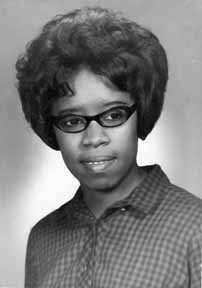 Stella Ruth Crockett Courtney was born on October 14, 1943, in Lubbock, Texas, and attended Dunbar High School where she was a member of the band. In the summer of 1961, after learning that Texas Tech would integrate, Stella was among a very small group of African Americans who decided to attend Texas Tech and together they formed a kind of support system for each other. Having turned down a band scholarship elsewhere Stella continued her musical training by joining the Texas Tech marching band, then lead by Dean Killion.
Stella Ruth Crockett Courtney was born on October 14, 1943, in Lubbock, Texas, and attended Dunbar High School where she was a member of the band. In the summer of 1961, after learning that Texas Tech would integrate, Stella was among a very small group of African Americans who decided to attend Texas Tech and together they formed a kind of support system for each other. Having turned down a band scholarship elsewhere Stella continued her musical training by joining the Texas Tech marching band, then lead by Dean Killion.
It was not an easy task to be among the first to break a long held barrier. Stella had to enroll in another section of a class because the first instructor used disparaging language toward her. Support from her family, church and community helped her stay on course and she pointed to her mother’s encouraging words of “sticking it out” as a motivator. “It’s my right to be here. I deserve an education and I’m going to get it,” she recalled in her March 3, 2010 oral history interview.
Influenced by strong mentors Stella knew from the 2nd grade she wanted to be a teacher. In May of 1965 she earned her bachelor’s degree in Elementary Education and thus became the first African American to attend Lubbock schools from K-12, attend all undergraduate years at Texas Tech and successfully graduate. Crockett retired in June of 2009 after 43 years of teaching.
One story shared about the band's integration years appears in the book Remember When? A History of African Americans in Lubbock, Texas. "...We were to march in the Cotton Bowl for the game and spend the night," recalled Stella's band mate Jean Nichols. "The only problem was that the Cotton Bowl had some rule about blacks on its playing field. None of the band members thought much about it until we were told that our black members could not march. As a drum section we informed Mr. Killion that if our black drummers could not go and march then we all would stay home… This was not done to make a statement but truly out of friendship and respect. As a group (the entire band) and especially the drum section, we made sure there were no back doors and no eating in the kitchen. Where we went our friends went." Dean Killion, then Band Director, made sure that his entire band was able to perform together.
Related collections within the University Archives and the Southwest Collection holdings:
Stella Courtney Crockett oral history interviews [sound recording], 2010 and
2014
See also:
Kristen Barton,
Diversity Exhibit Highlights First Black Woman to Graduate in Four Years From Texas Tech, Texas Tech Today, February 7, 2017
Michael Cantu, Defining Decades: Courtney Speaks on Experiences as First Black Tech Graduate
Daily Toreador, February 8, 2017
Amanda Castro-Crist, Texas Tech African-American History: Stella Courtney Crockett, Texas Tech Today, February 12, 2019
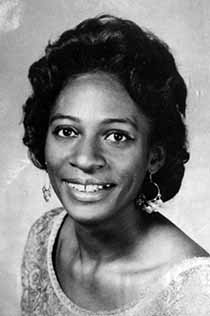 Vivian Imogene Davis was born on June 16, 1933 in Indianapolis, Indiana. She earned a bachelor’s degree from Ball State University in 1954 and a master’s degree in English Education from the University of Chicago in 1969. With a background in teaching English and Spanish at the high school and undergraduate level, as well as work experience in social work, Davis was hired as an assistant professor of English by Texas Technological College in February of 1972, making her the first female African American faculty member hired at the college as well as the second official African American faculty member hired (her husband, Dr. Emory Grant Davis, also hired in 1972, being the first). She acquired a doctoral degree from Northwestern University in June of 1973.
Vivian Imogene Davis was born on June 16, 1933 in Indianapolis, Indiana. She earned a bachelor’s degree from Ball State University in 1954 and a master’s degree in English Education from the University of Chicago in 1969. With a background in teaching English and Spanish at the high school and undergraduate level, as well as work experience in social work, Davis was hired as an assistant professor of English by Texas Technological College in February of 1972, making her the first female African American faculty member hired at the college as well as the second official African American faculty member hired (her husband, Dr. Emory Grant Davis, also hired in 1972, being the first). She acquired a doctoral degree from Northwestern University in June of 1973.
During her time at Texas Tech, Davis was a co-sponsor of the Student Organization for Black Unity at Texas Tech and actively shared her interest in teaching Black Literature to the campus and local community, serving as editor of the English Department’s Southwest Multi-Ethnic Newsletter and director of the Ethnic Studies program. Both she and her husband left Texas Tech in 1977 to accept teaching appointments at Bishop College in Dallas, Texas.
Dr. Davis continued to be active in the National Association for the Advancement of Colored People (NAACP), was chair of the Conference on College Composition and Communication in 1978, and served in several capacities in the National Council of Teachers in English (NCTE), including being heavily involved in the redirection and growth of the Black Caucus, serving as a member of the Advisory Board for its publication, College English, and holding several officer roles such as secretary in 1972-1973 and president in 1978-1980. More than two decades of service to NCTE resulted in her being awarded their Distinguished Service Award in 1994. In the early 1990s, she taught at Eastfield College in Mesquite, Texas for a decade, where a textbook scholarship continues to bear her name. Dr. Davis passed away on August 11, 2017.
Related collections within the University Archives and the Southwest Collection holdings:
Vivian Imogene Davis faculty file, 1972-2019
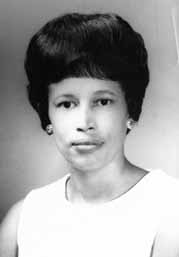 Hortense Williams Dixon holds the distinction of being the first African American to graduate from Texas Tech
with a doctorate degree. The chairman for her doctoral advisory committee, Dr. Berlie J. Fallon, described her academic work as being outstanding.
"Her defense of the doctoral dissertation was one of the most masterful I have ever attended in my fifteen years at Texas Tech."
Hortense Williams Dixon holds the distinction of being the first African American to graduate from Texas Tech
with a doctorate degree. The chairman for her doctoral advisory committee, Dr. Berlie J. Fallon, described her academic work as being outstanding.
"Her defense of the doctoral dissertation was one of the most masterful I have ever attended in my fifteen years at Texas Tech."
She was born on January 29, 1926, in Houston, Texas. Dixon attended several universities to acquire the appropriate degrees in higher education. She received her B.S. degree from Prairie View State College in 1946, a M.S. degree in 1949 from the University of Minnesota, and a Ed.D. degree from Texas Tech in 1970. Her degrees were in the area of education with a minor in home economics. While pursuing her studies she also held several academic positions, including Director of the Home Management Residence at Bishop College, Assistant Professor of Home Economics Education at Texas Southern University, and Part-time Instructor in Home Economics Education at Texas Tech University. After graduating from Texas Tech, Dixon returned to Houston to continue serving as an Associate Professor in home economics at Texas Southern University.
Related collections within the University Archives and the Southwest Collection holdings:
Hortense Williams Dixon Collection, 1970
See also:
Hortense Selena Williams Dixon, 1926-1988
(links to her biography on the Handbook of Texas website)
Amanda Castro-Crist,
Texas Tech African-American History: Hortense Selena Williams Dixon, Texas Tech Today, February 21, 2019
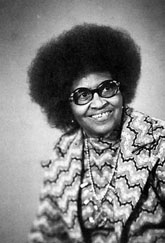 Lucille S. Graves is noted in her
oral history interview, conducted in 1974 by the Southwest Collection/Special Collections Library, as being the
first African American student at Texas Tech. She came to Tech with a bachelor’s degree and was working on her master’s
degree in the summer of 1961. It was Mrs. Graves’ persistent petitioning for entrance into the college that paved the way for
other African Americans to attend Texas Tech.
Lucille S. Graves is noted in her
oral history interview, conducted in 1974 by the Southwest Collection/Special Collections Library, as being the
first African American student at Texas Tech. She came to Tech with a bachelor’s degree and was working on her master’s
degree in the summer of 1961. It was Mrs. Graves’ persistent petitioning for entrance into the college that paved the way for
other African Americans to attend Texas Tech.
Her 10 minute interview discusses how, when repeatedly refused entrance into the college on the grounds that the its charter, Senate Bill No. 103, specifically outlines that Texas Tech is a college for white students, she in turn sought the help of the NAACP. Robert Cabiness Goodwin, President of Texas Tech, was contacted by the NAACP and was told a lawsuit would be filed if Texas Tech did not allow Mrs. Graves to attend.
Mrs. Graves shared her excitement at getting a call from Texas Tech President Goodwin, who told her that if she could get to the college within 15 minutes before registration shut down she would be able to enroll. She was so nervous she had to get a neighbor to drive her and, despite forgetting her transcripts, she did indeed make it to the college to enroll within the time limit.
Her quiet enrollment led to a peaceful, non-violent integration of the traditionally white college. In her oral history interview, Mrs. Graves harbored no ill-will toward the college nor its administration against their initial refusals to allow her attend. Her determination to gain the additional education she so desperately wanted shines through and perhaps it was because of this and her strength of character that she was able to achieve her goals in life.
The book, Remember When?: A History of African Americans in Lubbock, Texas, provides a biography of trail blazer Lucille Sugar Graves. Besides breaking the race barrier at Texas Tech, Mrs. Graves was also the founder of Mary and Mac, the first black private school in Lubbock, Texas, on September 17, 1955. She chose the name of her school after the children’s nursery rhyme on the reasoning that “This poem depicts the act of boys and girls in their desire to become useful in this society.” Eventually, Graves earned her doctoral degree from the University of Houston. She also continued to serve as administrator of the Mary and Mac Private School until retiring in 1991.
In a brief article in the February 25, 1982 issue of the Lubbock Digest (p. 10), Dr. Graves recalled the discrimination she faced in the classroom as the first African American to take classes at Texas Tech. She also stated that, despite two decades passing, the situation for African Americans at the university had not improved for the better, other than maybe for athletes, nor were prospects for the students following graduation much better.
Related collections within the University Archives and the Southwest Collection:
Lucille Graves oral history interview [sound recording], 1974.
Thelma Robinson and Katie Parks, “Schools” in Remember When?: A History of African Americans in Lubbock, Texas.
Lubbock: PrinTech, Texas Tech University, 1999: p. 101-108.
Phil Price, Equal Opportunity Hero: T.J. Patterson's Service to West Texas. Lubbock: Texas Tech University Press,
2017: p. 60-61. Lubbock: PrinTech, Texas Tech University, 1999: p. 101-108.
See also:
Lucille Sugar Barton Graves bio from the Handbook of Texas
Amanda Castro-Crist,
Texas Tech African-American History: Lucille S. Graves, Texas Tech Today, February 5, 2019
Commission to recognize East Lubbock's historical Mary and Mac School from the Lubbock Avalanche-Journal,
July 10, 2014
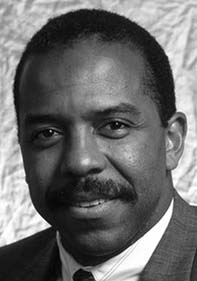 Bernard A. Harris, Jr., was born on June 26, 1956, in Temple, Texas. From ages 7-15 young Bernard lived with his mother on a Navajo Indian Reservation where she worked as a teacher. “She told me I could do anything,” Harris recalled in a 1995 University Daily interview and it was under her positive influence that he dreamed he could reach the stars. “I knew I wanted to be an astronaut when I first saw human beings land on the moon.”) He received his bachelor’s degree from the University of Houston in 1978 and his medical degree from the Texas Tech University School of Medicine in 1982. His residency in internal medicine at the Mayo Clinic was completed in 1985 after which he began working with NASA, where he completed a research fellowship in 1987 and training as a flight surgeon in 1988. From there he went to receive his master’s degree in biomedical science from UT Medical Branch in Galveston. Dr. Harris became the first African American appointed to the Texas Tech University Board
of Regents, serving in that capacity from 1993-1999. On February 3, 1995, Harris achieved another major milestone, becoming the first African American man to walk in space while serving on the first flight of the new joint Russian-American Space Program.
Bernard A. Harris, Jr., was born on June 26, 1956, in Temple, Texas. From ages 7-15 young Bernard lived with his mother on a Navajo Indian Reservation where she worked as a teacher. “She told me I could do anything,” Harris recalled in a 1995 University Daily interview and it was under her positive influence that he dreamed he could reach the stars. “I knew I wanted to be an astronaut when I first saw human beings land on the moon.”) He received his bachelor’s degree from the University of Houston in 1978 and his medical degree from the Texas Tech University School of Medicine in 1982. His residency in internal medicine at the Mayo Clinic was completed in 1985 after which he began working with NASA, where he completed a research fellowship in 1987 and training as a flight surgeon in 1988. From there he went to receive his master’s degree in biomedical science from UT Medical Branch in Galveston. Dr. Harris became the first African American appointed to the Texas Tech University Board
of Regents, serving in that capacity from 1993-1999. On February 3, 1995, Harris achieved another major milestone, becoming the first African American man to walk in space while serving on the first flight of the new joint Russian-American Space Program.
In a December 15, 1998 oral history interview, Dr. Harris remarked he wanted to be known as a visionary or a dreamer. His distinguished career has been as diverse and multicultural as his childhood. He departed NASA in April 1996, then took on the roles of Vice President of SPACEHAB, Inc., and Vice President of Business Development for Space Media, Inc. Later endeavors included founding the Houston based non-profit The Harris Foundation in 1998, joining the board of the National Math and Science Initiative in 2007, becoming Vice President of the American Telemedicine Association in 2009, and appointment to Vice Chairman of the Texas Medical Center Board of Directors. Currently, he serves as CEO and Managing Partner of Vesalius Ventures, Inc. a venture capital firm, that invest in early to mid-stage healthcare technologies and companies. In fall 2006, Dr. Bernard A. Harris, Jr. Middle School opened in Harris' home town of San Antonio, Texas. The Dr. Bernard Harris Jr. Pre-Medical Society at the Texas Tech University Health Sciences Center is named in his honor.
Related collections within the University Archives and the Southwest Collection holdings:
Bernard Harris Jr. reference file
See also:
NASA, Dr. Bernard A. Harris, Jr. biography
Harris Middle School
The Harris Foundation, Dr. Bernard A. Harris, Jr. biography
Harris Middle School
Rebecca Canfield, From Trekkie to Space Traveler: Bernard Harris Inspires Youth to Dream Big, Texas Living, undated
Harris Middle School
One Giant Leap of Faith, Texas Highways, November 2020
Suzanna Cisneros, Mentoring Others and Giving It His Best, TTUHSC Daily Dose, February 20, 2019
Texas Tech System, Bernard Harris Jr., Ph.D. - TTUHSC Graduate and Former NASA Astronaut (link to YouTube video)
UTSWMED, Anti-Racism Series: Bernard A. Harris, Jr., MD, MBA (link to YouTube video)
Dean's Scholars Student Association, 2022 Distinguished Lecture Series w/ Dr. Bernard A. Harris Jr. (link to YouTube video)
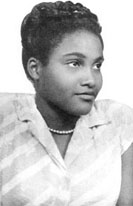 Ophelia Powell-Malone holds a place in Texas Tech history as the first African American to graduate with a
bachelor's degree. She transferred from Huston-Tillotson University in Austin, Texas, to attend Texas Tech shortly after
the college quietly integrated. A home economics major, Powell-Malone received her degree in 1964 and went on to become
a teacher in New Mexico. Later she worked as a dietitian at Langston University and in nursing homes in Lubbock and Houston.
Mentor Tech, a division of Institutional Diversity, Equity and Community Engagement, chose Powell-Malone as one of two
trailblazing individuals to honor in the naming of their program, which was established in 2002.
(photo courtesy of Mentor Tech)
Ophelia Powell-Malone holds a place in Texas Tech history as the first African American to graduate with a
bachelor's degree. She transferred from Huston-Tillotson University in Austin, Texas, to attend Texas Tech shortly after
the college quietly integrated. A home economics major, Powell-Malone received her degree in 1964 and went on to become
a teacher in New Mexico. Later she worked as a dietitian at Langston University and in nursing homes in Lubbock and Houston.
Mentor Tech, a division of Institutional Diversity, Equity and Community Engagement, chose Powell-Malone as one of two
trailblazing individuals to honor in the naming of their program, which was established in 2002.
(photo courtesy of Mentor Tech)
See also:
Ophelia Powell-Malone - Mentor Tech biography
Ophelia Powell-Malone biography at graduation, The Manhatten Heights, June 4, 1964
Callie Jones,
Ophelia Powell-Malone paved the way for progress, Texas Tech Today, March 21, 2016
2014 marks 50th anniversary of first African-American Tech graduate,
Lubbock Avalanche-Journal, May 16, 2014
Amanda Castro-Crist,
Texas Tech African-American History: Ophelia Powell-Malone, Texas Tech Today, February 7, 2019
Thomas James "T.J." Patterson Sr. was a member of an iconic family that broke multiple racial barriers in Lubbock, Texas. He was born in Waxahachie, Texas, on June 29, 1937, and grew up in Wichita Falls, where he attended Booker T. Washington High School, graduating in 1954. After earning a bachelor’s degree in physical education in 1958 from Bishop College, T.J. worked as an insurance agent in Fort Worth. His desire to participate in the Martin Luther King civil rights movement in Atlanta brought him to Lubbock, where he had arranged to pick up a vehicle from his aunt, Lucille “Suga” Graves. She was an educator who co-founded the first Black private school in Lubbock, the Mary and Mac Private School, with her husband, Cecil. T.J. relocated to Lubbock after meeting Bobbie Gean Bailey. The young couple married on August 19, 1960.
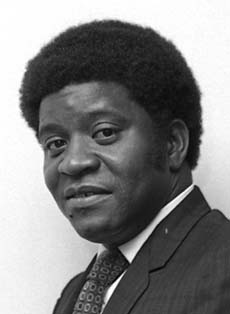 Returning to Lubbock, Patterson began serving as news manager in 1963 for Manhattan Heights, Lubbock’s independent and only Black newspaper, and was a news reporter and editor for The Manhattan Heights Times by 1964. He returned to Texas Tech on September 1, 1970, this time as an assistant to the dean of the business college. His popularity among the student body led to T.J. being selected “Man of the Year” by the 1976 La Ventana staff. By this time, Patterson was also serving as a freshman advisor in the business college and was a co-sponsor of the Saddle Tramps spirit organization. While employed at the university, he continued writing for the newspaper, renamed the West Texas Times in 1966, and did take two graduate courses at Tech in 1973. T.J., along with Eddie Richardson, co-founded the Southwest Digest newspaper in 1977. He departed the university on July 27, 1981, to work full-time as newspaper editor.
Returning to Lubbock, Patterson began serving as news manager in 1963 for Manhattan Heights, Lubbock’s independent and only Black newspaper, and was a news reporter and editor for The Manhattan Heights Times by 1964. He returned to Texas Tech on September 1, 1970, this time as an assistant to the dean of the business college. His popularity among the student body led to T.J. being selected “Man of the Year” by the 1976 La Ventana staff. By this time, Patterson was also serving as a freshman advisor in the business college and was a co-sponsor of the Saddle Tramps spirit organization. While employed at the university, he continued writing for the newspaper, renamed the West Texas Times in 1966, and did take two graduate courses at Tech in 1973. T.J., along with Eddie Richardson, co-founded the Southwest Digest newspaper in 1977. He departed the university on July 27, 1981, to work full-time as newspaper editor.
In 1984, T.J. moved into the arena of politics, becoming Lubbock’s first Black elected city council member. He was a proud founding member of the Texas Association of Black City Council Members. For the next 20 years, as the representative for District 2 in East Lubbock and briefly as mayor pro temp, Patterson fought for racial justice, worked to end neighborhood violence, labored to create political coalitions between Black and Hispanic residents, and tried to bring new economic development and city services to his underserved community. A vocal and prominent opponent against illegal drugs and violence, Patterson organized and participated in numerous marches. Moreover, he began visiting with inmates at the Lubbock County Detention Center on Christmas day, touring the facility, delivering treats, and encouraging the inmates to move their lives onto a positive track. The tradition grew to include other volunteers and would continue for more than three decades.
Patterson earned many well deserved accolades and awards over the course of his life. In 1995, the new east Lubbock library branch was named after T.J. and his wife, Bobbie Gean, a 1972 Tech graduate. A scholarship in both their names was established in TTU’s Mentor Tech program. T.J.’s failing health eventually led to the Southwest Digest printing its last issue on May 5, 2022, ending a 45-year publication run. Patterson passed at the age of 85 on September 21, 2022.
Related collections within the University Archives and the Southwest Collection holdings:
T.J. Patterson Sr. reference file
Thomas James Patterson oral history interviews [sound recording], 2011 - June 1999,
July 1999, and 2004
Eric Strong oral history interview [sound recording], 2011 - mentions Patterson several times
Thelma Robinson and Katie Parks, “Schools” in Remember When?: A History of African Americans in Lubbock, Texas.
Lubbock: PrinTech, Texas Tech University, 1999
Phil Price, Equal Opportunity Hero: T.J. Patterson's Service to West Texas. Lubbock: Texas Tech University Press,
2017: p. 60-61. Lubbock: PrinTech, Texas Tech University, 1999
See also:
Karen Wisely and Joel Zapata Thomas James Patterson oral history interviews [video recording], June 21, 2016, Civil Rights in Black and Brown Collection, TCU Mary Couts Burnett Library
Eric Strong oral history interview [sound recording], 2011 - mentions Patterson several times
Adam D. Young and Alex Driggars, "A Gift' to Lubbock, Texas, U.S.A.: T.J. Patterson, City Leader and First Black Councilman, Dies , Lubbock Avalanche-Journal, September 21, 2022
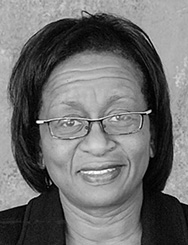 Growing up in segregated Dallas during the 1950s, Brenda J. Peters spent her early years helping out at her parents’ soul food restaurant. She was an avid reader who treasured the bi-weekly bookmobile visits to her Black neighborhood that had no library available nearby. Her high school years were challenging as she among the earliest group of African American students to attend a newly integrated, predominately white school. Entering Texas Tech in 1970, she once again found herself in the lonely position of being one of very few African American students on campus.
Growing up in segregated Dallas during the 1950s, Brenda J. Peters spent her early years helping out at her parents’ soul food restaurant. She was an avid reader who treasured the bi-weekly bookmobile visits to her Black neighborhood that had no library available nearby. Her high school years were challenging as she among the earliest group of African American students to attend a newly integrated, predominately white school. Entering Texas Tech in 1970, she once again found herself in the lonely position of being one of very few African American students on campus.
Peters worked hard to shine scholastically at Tech, earning a scholarship and the admiration of mentors such as Herschel Mann, accounting professor in the business college, along the way. She was inducted into the student honor organizations of Beta Alpha Psi, Beta Gamma Sigma, and Mortar Board. She was also a charter member and president of the Zeta Tau chapter of Alpha Kappa Alpha Sorority, Incorporated (AKA).
A distinguished career in public accounting followed Peters’ 1974 graduation from Tech. She was employed with Deloitte (Haskins & Sells), then served as director of investor relations and assistant treasurer for TEPPCO Partners, L.P., and afterwards became tax director for Houston-based Enterprise Products. Gender bias and racial discrimination were issues Peters faced and overcame in her childhood and in her professional career. Her leadership skills resulted in appointments to numerous community and Texas Tech advisory boards. Peters serves on the Houston Arts Alliance, Arts Connect Houston, Houston's Ensemble Theatre Board, the Jerry S. Rawls College Advisory Council, and she was a former board member of the Texas Tech Alumni Association. Recent accolades bestowed on her include the Mortar Board Alumni Achievement Award in 2006 and the Rawls College 2022 Distinguished Alumni Award.
She married the Honorable John S. Chase, Jr., and has one daughter, Christina. The struggles she faced as a first-generation Black student fueled her desire to help others. At Texas Tech, Peters established a scholarship for graduates of Jack Yates High School, a predominantly Black neighborhood in Houston where she and her family reside, and the Peters Family Accounting Scholarship Endowment for first-generation and underrepresented student populations. Additionally, she works with other high schools to encourage more African Americans to enroll at Tech. She is a notable supporter of programs sponsored by the Division of Diversity, Equity & Inclusion, such as Mentor Tech. Peters is a significant contributor to the establishment of the 2022 Black Cultural Center (BCC) on campus. The Peters Family Legacy Library in the BCC features books on Black culture and history and publications authored by Black writers.
See also:
Lucy Greenberg, From Defying Expectations to Historical Donations, Texas Tech Today, September 26, 2022
Mikayla Holmes, Texas Tech University Holds Grand Opening for Black Cultural Center, Everything Lubbock, September 9, 2022
Isaac Ortega, Alumni Reflect on Changes for African Americans, The Daily Toreador, February 27, 2000
Mateo Rosiles, Alumni Reflect on Changes for African Americans, Lubbock Avalanche-Journal, September 9, 2022
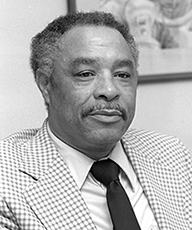 In September 1969, George Scott, Jr., became the first Black administrator at Texas Tech. He came to Tech after a career as a Harlem Globetrotter and then teacher and principal at Lubbock’s Dunbar High School. Beginning as Assistant Dean of Students, he spent 20 years advocating for Black people on campus. He immediately became a vocal critic of Tech’s lackluster efforts to recruit Black students and faculty, risking his professional future. In 1972, he served on the university’s first committee that studied the problems minority students faced on campus, which led to recommendations for an ethnic studies program, Black student advisor position, and a cultural center for minority students.
In September 1969, George Scott, Jr., became the first Black administrator at Texas Tech. He came to Tech after a career as a Harlem Globetrotter and then teacher and principal at Lubbock’s Dunbar High School. Beginning as Assistant Dean of Students, he spent 20 years advocating for Black people on campus. He immediately became a vocal critic of Tech’s lackluster efforts to recruit Black students and faculty, risking his professional future. In 1972, he served on the university’s first committee that studied the problems minority students faced on campus, which led to recommendations for an ethnic studies program, Black student advisor position, and a cultural center for minority students.
Scott also became concerned about Black students’ high attrition rates at Tech and was instrumental in obtaining funding for programs that would improve retention. Scott’s career is a testament to the role Black administrators have played in improving access and equity.
Related collections within the University Archives and the Southwest Collection holdings:
George Scott Jr. administrator file, 1970
George Scott Papers, 1944-1979 (1 microfilm reel)
See also:
Amanda Castro-Crist, Texas Tech African-American History: George Scott, Jr., Texas Tech Today, February 19, 2019
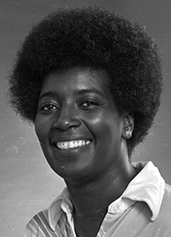 Jarvis Lavonne Scott was a world-class American sprinter and a track and field coach at Texas Tech University. Born in Waco, Texas, in 1947, Scott grew up in Los Angeles and started running professionally when she was just 20. Scott competed internationally for Team USA and was a four-time national champion. At the 1968 Olympics, Scott became the first Black woman to qualify for the 400- and 800-meter dash and placed sixth in the 400-meter dash.
Jarvis Lavonne Scott was a world-class American sprinter and a track and field coach at Texas Tech University. Born in Waco, Texas, in 1947, Scott grew up in Los Angeles and started running professionally when she was just 20. Scott competed internationally for Team USA and was a four-time national champion. At the 1968 Olympics, Scott became the first Black woman to qualify for the 400- and 800-meter dash and placed sixth in the 400-meter dash.
In 1975, she graduated from California State University-Los Angeles with a B.S. in Criminal Justice and then began working there as an assistant track coach and head cross country coach. She left in 1979 to accept a position at Tech as the women’s track and field coach. She oversaw the growth of women’s track at Tech and led the team to the NCAA Outdoor Tournament in 1989. She also helped attract Black athletes to Tech, many of whom found career success in track and field, including James Mays, Leonard Harrison, and Sharon Moultrie Bruner.
Scott quickly earned a reputation as a positive and skilled coach, and she was known among Texas Tech students for her energetic and motivational nature. “She was the most passionate coach I’ve ever, ever seen,” said Tim Torres, a Tech student manager from 1981-84. “She gave a hundred percent. I’ve never seen her give anything less than a hundred percent in anything she did.” She mentored men and women student athletes at Tech and worked as a lecturer at track workshops with Olympian Jesse Owens and UCLA track coach Jim Bush.
Active in her church and the Lubbock community, Coach Scott retired from Texas Tech in 1991, leaving behind a legacy of a thriving women’s track and field team. She passed away at age 70 in 2017. On February 16, 2022, Texas Tech’s track program announced the last regular season indoor track and field meet at the university would be named in her honor.
See also:
Texas Tech Introduces Inaugural Jarvis Scott Open, Texas Tech Athletics, February 16, 2022
Don Williams, Jarvis Scott, Olympian and Former Tech Coach, Dies at 70, Lubbock Avalanche-Journal, October 3, 2017
 Eric Emerson Strong was a Lubbock native, born in 1952. Having been raised during the Jim Crow era, Strong and his family faced white supremacist policies directly, as his father did not get paid as much as his white co-workers. He eventually graduated from Dunbar High School and received a bachelor’s degree from Prairie View A&M University. He made his mark at Texas Tech by opening opportunities for Black students. In 1981, he began working in the Upward Bound program and then became its director in 1997. This program focused on improving access for low-income students, many of whom were Black, to the university. The program provided financial aid, a nurturing and positive environment, and supplemental instruction in mathematics, writing, and personal enhancement skills for students to thrive at Tech. In total, he served Tech’s Upward Bound program for more than 25 years.
Eric Emerson Strong was a Lubbock native, born in 1952. Having been raised during the Jim Crow era, Strong and his family faced white supremacist policies directly, as his father did not get paid as much as his white co-workers. He eventually graduated from Dunbar High School and received a bachelor’s degree from Prairie View A&M University. He made his mark at Texas Tech by opening opportunities for Black students. In 1981, he began working in the Upward Bound program and then became its director in 1997. This program focused on improving access for low-income students, many of whom were Black, to the university. The program provided financial aid, a nurturing and positive environment, and supplemental instruction in mathematics, writing, and personal enhancement skills for students to thrive at Tech. In total, he served Tech’s Upward Bound program for more than 25 years.
Strong made an impact in the community through his promotion of Black history and the local arts. As director of the Roots Historical Arts Council of Lubbock and chair of the Midland Texas Roots Historical Arts Center, Strong believed that appreciating Black culture was important. He founded the Caviel Museum of African American History, which was the first museum of its kind in West Texas. He was also a nationally recognized storyteller, spinning tales with themes of hope, self-esteem, and tolerance, complemented with poetry, song, dance, and puppetry. Additionally, he founded the annual Caprock Jazz Festival, a major fundraiser for both the Roots Historical Arts Council and the Caviel Museum of African American History.
Strong’s devotion to the arts led him to be named “Man of the Year'' by two different local organizations. Throughout his life, he worked as a volunteer, honoring others and the Lubbock community. On March 11, 2017, he passed away at the age of 64. The Eric E. Strong Memorial Grove tree dedication ceremony was held in his honor on June 14, 2019 in Mae Simmons Park.
Related collections within the University Archives and the Southwest Collection holdings:
Eric Strong reference file
Eric Strong oral history interviews - 1979 and 1992,
and 2011
See also:
Karen Wisely, Joel Zapata and Eric Strong, Eric Strong Oral History Interview (5 video recordings), June 21, 2016, Civil Rights in Black and Brown Collection, TCU Mary Couts Burnett Library
Christy Martinez-Garcia, The Legacy of Eric Strong Lubbock Roots Historical Arts Council, March 11, 2017
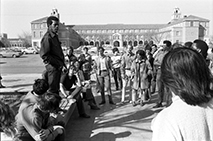 The Student Organization for Unity and Leadership (SOUL) was Texas Tech's first Black student organization. Established in 1967, 35 Black students joined together in SOUL at a time when Tech enrolled only 65 Black undergraduate students. One member explained that “student unrest and a desire for identification were the reasons for the formation of SOUL.” Together, they drafted SOUL’s motto to "enhance African American awareness at Texas Tech as well as in the community."
The Student Organization for Unity and Leadership (SOUL) was Texas Tech's first Black student organization. Established in 1967, 35 Black students joined together in SOUL at a time when Tech enrolled only 65 Black undergraduate students. One member explained that “student unrest and a desire for identification were the reasons for the formation of SOUL.” Together, they drafted SOUL’s motto to "enhance African American awareness at Texas Tech as well as in the community."
Early members faced many adversities in establishing SOUL as an official organization on campus. SOUL spent three years on probationary status until it became an official student organization in 1971. When it finally gained official recognition, SOUL sponsored an event called “Black Week” to broadcast Black culture through music, food, films and fashion. The event was open to anyone who wanted to learn more about African American culture.
In October 1971, SOUL was renamed the Student Organization for Black Unity (SOBU). The same month, SOBU created a Homecoming Sweetheart, which featured Brenda Brightman, a sophomore business education major, who was featured in the homecoming parade. Miss Black TTU is now a tradition that is carried on by the Texas Tech Black Student Association (BSA). SOUL held many events to uplift Black students on campus and challenged the negative stereotypes many had associated with the Black community. SOUL’s goals and motto still flow through Texas Tech to this day through BSA and the Black Cultural Center.
Related collections within the University Archives and the Southwest Collection holdings:
Black Student Organization reference file
Student Organization for Black Unity reference file
Student Organization for Black Unity Records, 1967-1980
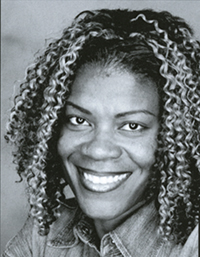 Born in 1971 in Brownfield, Texas, Sheryl Swoopes is one of the most recognizable Red Raider athletes of any sport. At Texas Tech, Swoopes became a national talent, leading the Lady Raiders to a 1993 national championship, the first in university history, under legendary coach Marsha Sharp. That year, Swoopes was named the Naismith College Player of the Year and Sportswomen of the Year.
Born in 1971 in Brownfield, Texas, Sheryl Swoopes is one of the most recognizable Red Raider athletes of any sport. At Texas Tech, Swoopes became a national talent, leading the Lady Raiders to a 1993 national championship, the first in university history, under legendary coach Marsha Sharp. That year, Swoopes was named the Naismith College Player of the Year and Sportswomen of the Year.
After leaving Texas Tech, Swoopes became the predominant face of women’s basketball. She won a gold medal for Team USA at the 1996 Olympics. The next year, the Houston Comets selected her as the fifth pick in the inaugural Women’s National Basketball Association (WNBA) draft, and Swoopes led the team to the first WNBA championship. During her career, she won the WNBA’s MVP award three times and four WBNA championships. Swoopes’ stellar performance led to a Nike contract, where she became the first women’s basketball player with a shoe line: the “Air Swoopes.” She was often compared to Michael Jordan and famously played him in 1 on 1.
After her professional basketball career, Swoopes came back to Texas Tech as a color analyst and Director of Player Development. She is recognized as a trailblazer in women’s basketball. Sports Illustrated named her one the most important women athletes of the early 2000s. She was inducted to the Texas Sports Hall of Fame, the Basketball Hall of Fame, and the Woman’s Basketball Hall of Fame. She remains one of the only women to have her number retired by Texas Tech.
Related collections within the University Archives and the Southwest Collection holdings:
Sheryl Swoopes reference file
Margaret E. Wilson Papers, 1935-2007 - files on Sheryl Swoopes, 1993-2007
See also:
Michael Burgan. Sheryl Swoopes, Philadelphia: Chelsea House Publishers, 2001
Pamela Grundy and Susan Shackelford, Shattering the Glass: The Remarkable History of Women's Basketball, The New Press, 2005
Jordan Ligons, Sheryl Swoopes Gets Back to Her Roots, Just Women's Sports, July 20, 2022
Steven J. Overman and Kelly Boyer Sagert. Icons of Women's Sport, Santa Barbara: Greenwood, 2012
Sheryl Swoopes, Greg Brown and Doug Keith. Bounce Back, Dallas: Taylor Publishing, 1996
Sheryl Swoopes 2004 Inductee, Texas Women's Hall of Fame, 2004
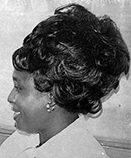 Born in 1928 in Houston, Texas, Hazel Scott Taylor received her bachelor’s degree from Prairie View A&M University before attending the Texas Tech University Graduate School. She received her master’s in education on August 22, 1964 and her doctoral degree on August 19, 1972. During her time as a graduate and doctoral student, Taylor was a member of Delta Sigma Theta Sorority. In July of 1971, she became the first recipient at Tech for the Ford Foundation Advanced Study Fellowship for Black Americans.
Born in 1928 in Houston, Texas, Hazel Scott Taylor received her bachelor’s degree from Prairie View A&M University before attending the Texas Tech University Graduate School. She received her master’s in education on August 22, 1964 and her doctoral degree on August 19, 1972. During her time as a graduate and doctoral student, Taylor was a member of Delta Sigma Theta Sorority. In July of 1971, she became the first recipient at Tech for the Ford Foundation Advanced Study Fellowship for Black Americans.
In her spare time, Taylor served on numerous committees and boards including the Lubbock Airport Board, the Young Women Christian Association Board, the Contact Lubbock Board, and the Board for the Lubbock League of Women Voters. She was a very involved member of the St. Luke Baptist Church, where she served as the Sunday school secretary chairperson of the Board of Christian Education, president of the Deaconess Board, and as a teacher of the Hope Circle in the Mission Two Society.
Taylor served as the county home demonstration agent for Milam County and briefly taught in the Muleshoe and Lubbock Independent school districts. On June 15, 1973, she formally accepted an invitation to join the faculty of Tech as Assistant Professor with a salary of $12,200. On February 5, 1979, Taylor was awarded tenure from the Board of Regents and promoted to the rank of Associate Professor effective September 1, 1979. Though retired in 1988, she continued to teach part-time at Texas Tech through the fall of 1989. She was also heavily involved in local community boards and committees. Dr. Taylor passed away in Lubbock on August 5, 1995.
Related collections within the University Archives and the Southwest Collection holdings:
Hazel Scott Taylor faculty file, 1972-1995
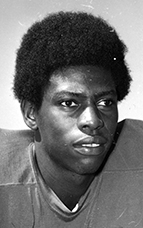 Kenneth Wallace was born in Lubbock, Texas on October 29, 1951. He attended Estacado High School where he led his football team to a 14-0 record and a state championship in 1968, the school’s first year of varsity competition. After graduating high school in 1970, Wallace received a full scholarship to play football at Texas Tech University. During his time with the Red Raiders, he played in the 1972 Sun Bowl, the 1973 Gator Bowl, earned All-Southwest Conference honors in 1973 and 1974, and received the Donny Anderson sportsmanship award in 1974.
Kenneth Wallace was born in Lubbock, Texas on October 29, 1951. He attended Estacado High School where he led his football team to a 14-0 record and a state championship in 1968, the school’s first year of varsity competition. After graduating high school in 1970, Wallace received a full scholarship to play football at Texas Tech University. During his time with the Red Raiders, he played in the 1972 Sun Bowl, the 1973 Gator Bowl, earned All-Southwest Conference honors in 1973 and 1974, and received the Donny Anderson sportsmanship award in 1974.
Wallace was the first Black American football player to graduate from Tech in 1974. After his college football career, he continued to show his passion for the sport and became head coach at Dunbar High School and Coronado High School. He would be the first Black man hired to be head coach in any sport at one of Lubbock’s predominantly white public high schools. He also was the first person from within the Lubbock school system to be hired as head football coach at one of the city's then-Class 5A schools. He was inducted as a Texas PTA Honorary Lifetime Member. Wallace earned Coach of the Year in 1981 and 1982, and in 1999 Wallace was selected as one of the South Plains’ Top 100 Athletes.
He continued to serve the Lubbock education community as principal at Estacado until moving into upper administration at North Shore Senior High School and Galena Park ISD. Wallace passed away on Friday, June 24, 2022 at the age of 70 in Houston, Texas.
See also:
Kenneth Wallace, LISD Hall of Honor, 2016
Don Williams, Kenneth Wallace, Texas Tech and Lubbock ISD Trailblazer, Dies at 70, Lubbock Avalanche-Journal, June 24, 2022
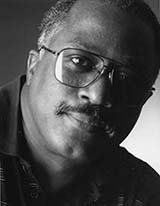 James C. Watkins was born on May 28, 1951, in Louisville, Kentucky. Even from a young age art was a passion of his, and in a November 20, 2009 oral history interview he shared how his grandmother and mother encouraged his development by allowing him to use old calendars as drawing pads and supporting him taking “Draw Me” art correspondence courses. James continued his education by receiving his M.F.A. from Indiana University and his B.F.A. from the Kansas City Art Institute. James taught at Indiana University and Hampton University before coming to Texas Tech in 1983 as an assistant professor in architecture.
James C. Watkins was born on May 28, 1951, in Louisville, Kentucky. Even from a young age art was a passion of his, and in a November 20, 2009 oral history interview he shared how his grandmother and mother encouraged his development by allowing him to use old calendars as drawing pads and supporting him taking “Draw Me” art correspondence courses. James continued his education by receiving his M.F.A. from Indiana University and his B.F.A. from the Kansas City Art Institute. James taught at Indiana University and Hampton University before coming to Texas Tech in 1983 as an assistant professor in architecture.
For over 35 years, he has specialized in ceramics, particularly in the use of raku. He is a co-author of two books, Alternative Kilns & Firing Techniques and Architectural Delineation, Presentation Techniques and Projects, and is the subject of a third book, A Meditation of Fire: the Art of James C. Watkins by Texas Tech Press. In 2005 he became a Fulbright Scholar and went to Vietnam to teach at the Ho Chi Minh City University of Architecture. His contributions to the field of art were recognized at Texas Tech in 2006 with his promotion to the high rank of Horn Professor. His ceramics are internationally recognized. Examples of his work reside in the White House Collection of American Crafts, the Shigaraki Institute of Ceramic Studies in Japan, the Texas Tech University Public Art Collection, and they have also been part of two different Smithsonian exhibits. He has authored one book, Reflections Made of Memories (2019), and co-authored two books, Alternative Kilns & Firing Techniques (2006) and Architectural Delineation, Presentation Techniques, and Projects (2001). He has authored numerous articles for publications such as Ceramics Monthly, Studio Potter, New Ceramics: The European Ceramics Magazine, and China Ceramic Artist. The 1999 Texas Tech University Press book, A Meditation of Fire: The Art of James C. Watkins by Kippra D. Hopper highlights his work techniques and artistic philosophies. Now retired from the university, Watkins continues to be an active artist and exhibit his work in museums and galleries.
Related collections within the University Archives and the Southwest Collection holdings:
James Watkins oral history interview [sound recording], 2009
James Curley Watkins faculty file, 1983-2001
James C. Watkins reference file
See also:
James C. Watkins' website
Texas Master Series: James C. Watkins
Andy Coughlan, Southeast Texas Art Museum Features a Career in Ceramics, Beaumont Enterprise, January 13, 2023
Texas Master Series: James C. Watkins
Hannah Dean, James C. Watkins on Tradition, Place, and Lucid Dreaming, Glasstire (Texas Visual Art), February 20, 2021
Texas Tech University Museum to Open Horn Professor Emeritus James C. Watkins Exhibition, KCBD, January 14, 2020
